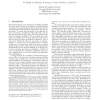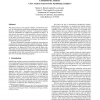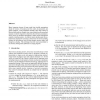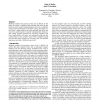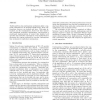84
Voted
PLDI
1996
ACM
15 years 6 months ago
1996
ACM
116
click to vote
PLDI
1996
ACM
15 years 6 months ago
1996
ACM
Two key steps in the compilation of strict functional languages are the conversion of higher-order functions to data structures (closures) and the transformation to tail-recursive...
100
Voted
PLDI
1996
ACM
15 years 6 months ago
1996
ACM
This paper presents a new analysis technique, commutativity analysis, for automatically parallelizing computations that manipulate dynamic, pointer-based data structures. Commutat...
107
Voted
PLDI
1996
ACM
15 years 6 months ago
1996
ACM
Many important classes of bugs result from invalid assumptions about the results of functions and the values of parameters and global variables. Using traditional methods, these b...
103
Voted
PLDI
1996
ACM
15 years 6 months ago
1996
ACM
High performance compilers increasingly rely on accurate modeling of the machine resources to efficiently exploit the instruction level parallelism of an application. In this pape...
156
Voted
PLDI
1996
ACM
15 years 6 months ago
1996
ACM
Building compilers that generate correct code is difficult. In this paper we present a compiler testing technique that closes the gap between actual compiler implementations and c...
113
click to vote
PLDI
1996
ACM
15 years 6 months ago
1996
ACM
Dynamic compilation enables optimizations based on the values of invariant data computed at run-time. Using the values of these runtime constants, a dynamic compiler can eliminate...
99
Voted
PLDI
1996
ACM
15 years 6 months ago
1996
ACM
105
Voted
PLDI
1996
ACM
15 years 6 months ago
1996
ACM
Traditional first-class continuation mechanisms allow a captured continuation to be invoked multiple times. Many continuations, however, are invoked only once. This paper introduc...
88
Voted
PLDI
1996
ACM
15 years 6 months ago
1996
ACM
